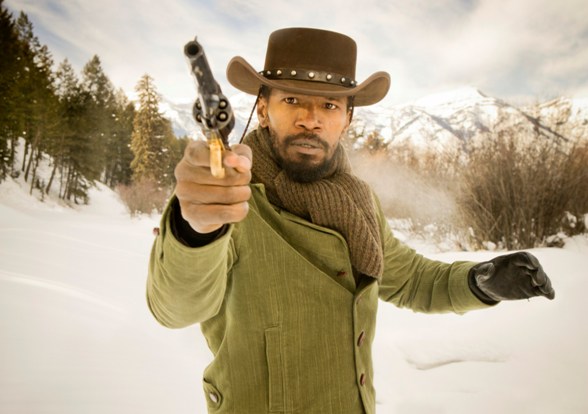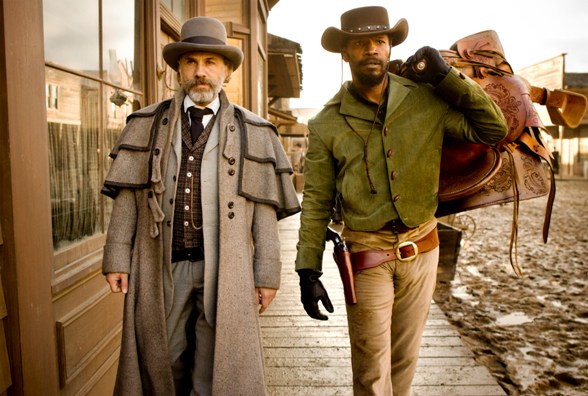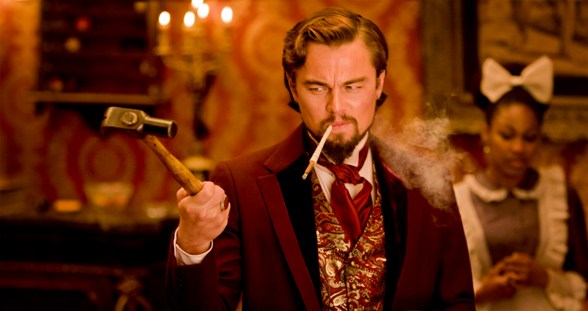
In these uncertain times, it is always reassuring to know that certain anchors remain that we can orient our lives around. That the sun will rise in the east and set in the west, for instance. That politicians will continue to be economical with the truth. That Quentin Tarantino will never quite mature as a film-maker.
Cruel? I think not. The Tarantino that wrote and directed the just-released Django Unchained is not far removed from Tarantino that wrote and directed Reservoir Dogs back in 1992. First and last and always, he is a showman and a bit of a show-off; when presented with two routes from A and B, he will ten times out of ten eschew simple and straightforward for the scenic, stylistic and the digressive. When this approach to film making works, it does works well: Tarantino’s triumvirate of early movies, Reservoir Dogs, 1994’s Pulp Fiction and 1997’s Jackie Brown are an almost perfect synthesis of style and substance. But then he is all too often overwhelmed by his own excess. The two Kill Bill films are living testament to the futility of asserting empty iconography over the essentials of plot and narrative.
But on to Django Unchained. Texas, 1858, and the slave Django is offered his liberty after he is purchased by the eccentric German Dr. King Schultz. There is a catch, naturally: Schultz is a bounty hunter, and needs Django’s help in tracking his current targets, the plantation overseers who cruelly separated Django from his wife Broomhilda. Not that this overly troubles Django. “I’ll kill white folk and get paid for it? What’s not to like?”
But now a free man, he wants to rescue Broomhilda, sold to southern gentleman (this is not meant as a compliment, by the way) and breeder (sorry, ugly word, but that’s pretty much what it is) of Mandingo fighters, Calvin Candie. Schultz, a gentleman cut from a different cloth, has a soft spot for Django and intrigued by the freeman’s German-speaking wife (long story, don’t ask) agrees to help.

Django Unchained is very much a film of two halves, the twin themes of liberty and vengeance held together precariously by a selection of Tarantino’s favourite leitmotifs: sharp wordplay, sensationalism, overstatement and the liberal application of gratuitous violence whenever the onset of subdued self-reflection threatens. His self-penned script, sharp and witty, has much to be said in its favour; a dogged determination to establish mise-en-scene with reference to his beloved stylistic tics less so. It’s not that the distinctive zoom shots and a heroic score culled from classic westerns do not hold some entertainment value in themselves. But it does feel at times that Tarantino plays his hand too soon, thrusting upon the viewer a preferred prevailing sensibility that might have been the more effective if allowed to evolve organically.
Of the acting, Leonardo DiCaprio brings an oleaginous effectiveness to the role of plantation master Candie; Jamie Foxx, in the title role, is curiously leaden, a woodenness all the more evident when paced against Christoph Waltz’s Schultz. Waltz, who won an Oscar for his part in Tarantino’s Inglourious Basterds, has thanks to Tarantino become perhaps the most effective character actor around today; one must acknowledge that the director knows how to coax the best out of his actors when he puts his mind to it.

There is a recurring argument along the lines that Tarantino, the showman, makes his films as part of a larger meta-narrative, one where he always plays the leading role. It’s there in the nods and winks to his extensive knowledge of contemporary cinema that he brings to his films; it’s also there in the provocative streak that he infuses in many of them. Django Unchained is a wilfully disturbing film on many levels: there’s Samuel L. Jackson’s delicious, yet deeply political incorrect portrayal of Stephen, Candie’s retainer, for one thing. Then there is the visceral, raw depiction of the brutality of the slave trade, always teetering between painful authenticity and pointless pornography.
Does Django Unchained make light of the human misery that even today underpins the racial tensions of the United States? At one point during the film, I found myself thinking back to the adaptation of Alex Haley’s seminal Roots, wondering whether Tarantino might succumb to the temptation of inserting a crass reconfiguration of the Kunta Kinte/Toby moment (Google it). I wasn’t at all angry, just a little sad that Tarantino, it seemed, could not resist jazzing up his slave western with a borderline tasteless sensibility absent from his inspirations.
Then I caught myself. It was very likely that I was one of a very few people in the cinema who had actually watched Roots (or Spaghetti Westerns, or Blaxploitation movies for that matter) first time around, who could actually appreciate first-hand the well from which Tarantino draws inspiration. (Incidentally, I’m not that old: it just seems that everyone is younger these days.)
And it’s perhaps in this that the elusive genius of Tarantino lies; a talent for re-interpreting for contemporary audiences the tropes of a previous age. He may be a showman, but he is certainly of the current age. Perhaps Quentin Tarantino has no need to grow up, after all. He’s right where he wants to be.





